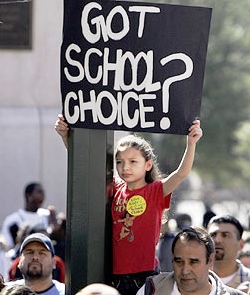 What would happen if a government-run high school put on a program featuring a song with the words, “There is no other truth except Jesus Christ”?
What would happen if a government-run high school put on a program featuring a song with the words, “There is no other truth except Jesus Christ”?
I’m betting that half a dozen civil liberties groups such as the ACLU would be threatening to file lawsuits to protect against this “establishment of religion” in schools. Why does it never seem to happen when it’s not a Christian message being presented?
In Grand Junction, Colo., a high school choir is preparing for a program that will include an Islamic worship song called “Zikr.” I hope you’ll listen to it. I like the music and think it would probably be beautiful as a live performance when sung properly by a choral group. It has value as a way to learn another culture.
But the song contains lines — in the Urdu language — that say “There is no truth except Allah” and “Allah is the only eternal and immortal.” When the choir teacher gave the students the translation of what they were to sing, one senior boy said he couldn’t sing those words. When the school refused to remove the song from the program, he quit the choir.
“In the Bible, [it says] that you don’t worship any other god — and this is worshipping another god and even another prophet,” said James Harper, who’s a Christian and is active in his church. “I think there would be a lot of outrage if we made a Muslim choir say ‘Jesus Christ is the only truth.'”
The First Amendment to the U.S. Constitution is supposed to guarantee people freedom of religion, but Supreme Court decisions over the years have made it much more complicated than that. You can make a good case for allowing schools more leeway in determining what religious expression is appropriate in schools, and you can also make an argument for allowing no religious expression of any kind.
The problem is that courts have tried to establish a nebulous boundary between the two, splitting hairs to allow some narrow things, but not allowing other things that seem very similar to those who don’t follow the legal arguments.
If I were a high school student, I wouldn’t be willing to sing, “There is no truth except Allah.” I would quit the choir, too, if forced to make a choice. The question is why we force people to make such choices.
Why do we need a system of government-run schools? Unless the purpose is to make sure that the state controls what people believe, there is no rational purpose for having the system run in such a centralized and monopolistic way.
Why not let parents buy education services for their kids just as they buy food and clothes and medical services for their children already? Even if you believe in the morality of the coercive state, why not simply tell parents they’re responsible for educating their children — in the same way they’re required to feed and clothe them — and then let the parents decide how to do that? Even if you insist that some parents couldn’t afford to send their children to schools, you could set up a need-based credit system that works similar to food stamps.
 Then let a thousand schools bloom. Some would work better than others and would attract more students. Some would cater to certain specialized desires. Some would be Christian. Some would be Jewish. Some would be Islamic. Some would be so secular that religion would never even come up. Some might be hyper-strict and structured. Others might be laid-back and unstructured. There are many different ideas about how to run schools. Why not let people pursue the ideas they want to pursue — and then let parents decide which models to choose?
Then let a thousand schools bloom. Some would work better than others and would attract more students. Some would cater to certain specialized desires. Some would be Christian. Some would be Jewish. Some would be Islamic. Some would be so secular that religion would never even come up. Some might be hyper-strict and structured. Others might be laid-back and unstructured. There are many different ideas about how to run schools. Why not let people pursue the ideas they want to pursue — and then let parents decide which models to choose?
As long as we try to have the government-run “one size fits all” school system, we’re not going to quit having these battles over what’s allowed and what’s not. Even worse, we’re never going to know just how good education could be if government would get out of the way and let the market do its job.
 Don’t show me the past or the future; show me what you can give now
Don’t show me the past or the future; show me what you can give now Hospital’s five-year fight to move shows health care isn’t free market
Hospital’s five-year fight to move shows health care isn’t free market You’ve been lied to: Freedom and democracy are different things
You’ve been lied to: Freedom and democracy are different things